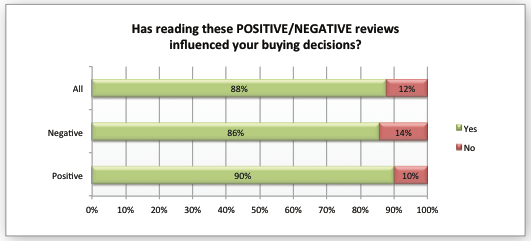Legal Tips for Using Customer Testimonials

This story originally appeared on KISSmetrics
Editor’s Note: For any questions regarding the law, please consult an attorney.
Customer testimonials are great for your business. They build customer trust, create goodwill for your product, and show potential customers a positive brand history. But there are some things you need to watch out for when using them. Endorsements and testimonials are governed by truth-in-advertising laws.
First, we’ll take a look at the effectiveness of testimonials, and then we’ll go over four key legal tips for using them correctly.
Effectiveness of Reviews and Testimonials
Let’s examine whether testimonials are actually useful. It seems almost self-explanatory that when choosing between two similar providers, the one with excellent reviews and numerous testimonials would appear to be the better choice. But just how persuasive are reviews?
Quite a bit, it seems. Over 70% of customers look at product reviews before purchasing, and a survey sponsored by Zendesk found that 90% of participants were influenced in their buying decisions by positive reviews, which is huge. Take a look at the graph below:

If your business can capitalize on positive customer testimonials and reviews, that will almost certainly influence the buying decisions of your customers. The primary reason is testimonials build trust. They show that your business is good at what it does and that your product does what you say it will. Testimonials also go a long way toward showing a history of good service, which is extremely important to most customers. They want to know that you’re not just a flash in the pan.
Testimonials should be authentic and not “salesy” so that they stand out as unbiased and genuine accounts of how happy your customers were with what you provided. Sincere and high-quality testimonials not only help to overcome the doubts of skeptics about your product, they even go a long way toward changing the minds of prospects who aren’t sure about the legitimacy of your product.
The reason for this is called “social proof,” which is also known as social influence. Social proof is essentially the power of the crowd. If a person is unsure of something (like a product or a business) but everyone else seems to love it, that person is more likely to give it a chance.
But there are specific rules that you need to follow if you are using testimonials or endorsements. The law says that they must be truthful and not misleading.
Let’s take a look.
1. Disclose Your Relationship with the Endorser
You must disclose any special relationships between you and your endorsers. For example, employees who promote your product must disclose that they are your employees, and business owners must create a policy that states this. Within your business, you should make sure you share this policy with employees, shareholders, and investors.
One way that endorsers can disclose their connections is to include tags or hashtags on social media promotions. For example, have a look at this tweet about Nutella from Brooke Burke-Charvet:

You can see that at the end of her tweet, she uses the #ad hashtag. This shows that she is promoting Nutella as an advertisement, and that she is being paid to promote it.
As another example, Amazon requires that all Amazon Associates (business owners and bloggers who earn referral fees by placing links to products for sale on Amazon.com on their own websites) must disclose that they are an Amazon affiliate and that they are paid when users purchase a product from their promotion.
You can be held liable for failing to disclose material connections with your endorsers.
All disclaimers and disclosures should be in clear, simple language so that viewers can’t miss or misunderstand your message. For example, use the #ad tag or a short statement like “This product was sent to us for review purposes” or “This review was funded by [Company].”
2. Ensure That Testimonials Are Accurate
You need to make sure all testimonials are accurate. One of the primary rules of the Federal Trade Commission (FTC) is that endorsements must reflect the honest opinions, findings, beliefs, or experiences of the endorser.
The FTC uses the following example to show how honesty about products should be conveyed:
“An advertisement for a weight-loss product features a formerly obese woman. She says in the ad, “Every day, I drank 2 WeightAway shakes, ate only raw vegetables, and exercised vigorously for six hours at the gym. By the end of six months, I had gone from 250 pounds to 140 pounds.’ … Because the endorser clearly describes the limited and truly exceptional circumstances under which she achieved her results, the ad is not likely to convey that consumers who weigh substantially less or use WeightAway under less extreme circumstances will lose 110 pounds in six months.
“If the advertisement simply said that the endorser lost 110 pounds in six months using WeightAway together with diet and exercise, however, this description would not adequately alert consumers to the truly remarkable circumstances leading to her weight loss.”
The other aspect of this (also illustrated by the above example from the FTC) is that endorsements must reflect typical experiences; and if the experience is not typical, it should be disclosed in an easy-to-spot disclaimer. Here’s an example of what this type of disclaimer would look like:

You can be held liable for false or unsubstantiated statements made through endorsements.
3. Get Written Permission from Your Customers
Be sure to keep a paper trail of any endorsement agreements or arrangements that you set up. If a customer agrees to endorse your product, get their agreement in writing (an email is sufficient).
This protects you in case a customer later wants to retract their testimonial. If they’ve agreed in writing that you can use their testimonial for a set period of time, you won’t have to remove their testimonial until the contract ends.
You can include clauses in your Terms of Service or Privacy Policy that any user reviews submitted to your website can be used for marketing purposes.
4. Don’t Lift Testimonials from Review Websites
If you see a good testimonial for your product on another site, don’t just copy and paste it onto your own website. Most review sites have a clause in their Terms of Service stating that user-generated content (such as reviews or testimonials) is owned by the user and licensed to the website.
This means that if you copy and paste the testimonial, you are infringing on the intellectual property rights of the person who wrote the review, which is not the best way to treat people who love your product!
Instead, you can use links on your website that go to these review sites, or you can use plug-ins that connect to crowdsourcing review websites like Yelp. If you want to have reviews easily available on your own site, use resources such asBazaarVoice.
Conclusion
Remember that you can be held liable for false or unsubstantiated statements made through endorsements and for failing to disclose material connections with your endorsers.
It’s not hard to follow the FTC’s guidelines. Simply ensure that all testimonials are honest and that they accurately represent the product. Also, ensure that you and your endorsers disclose all affiliations and any payments that are being made for the testimonial. By following these rules, you can benefit from the use of testimonials without being subjected to investigations or penalties from the FTC.
Editor’s Note: For any questions regarding the law, please consult an attorney.
Customer testimonials are great for your business. They build customer trust, create goodwill for your product, and show potential customers a positive brand history. But there are some things you need to watch out for when using them. Endorsements and testimonials are governed by truth-in-advertising laws.
First, we’ll take a look at the effectiveness of testimonials, and then we’ll go over four key legal tips for using them correctly.





